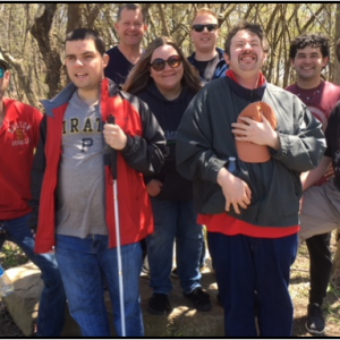Systematic Skill Building (SSB) uses evidence-based methods to help the participant acquire skills that promote independence and integration into the community, which are not behavioral in focus. Systematic Skill Building staff (SSBs) create Systematic Skill Building Plans (SBPs) based on the needs, preferences and skill deficits of the individuals served. The SSB then teaches the individual, staff, family and others how implement the SBPs. People who provide other supports such as Community Support, Supported Employment, Day Habilitation or Residential Habilitation are primarily responsible for implementation of the SBP. Other people with regular contact with the participant—such as family, friends, neighbors, and employers–may also implement the SBPs to ensure the participant’s skill acquisition. Combining paid and natural supports in using the same SBPs also promotes generalization of skills across different environments. Possible skills include learning how to cook, clean, social skills, activities of daily living, or use public transportation etc.
SSB Plan Development Stage:
- The SSB conducts an evaluation and collects data on the participant’s skill levels, abilities and learning style that is related to goals in the Individualized Service Plan (ISP). The evaluation may include the participant’s history with skill acquisition as well as the participant’s baseline skills.
- Within 60 days of the start date of SSB services, a SBP must be developed to address objectives that are in line with the goals of ISP. The SBP uses Applied Behavior Analysis and techniques such as backward and forward chaining, prompting, fading, generalization and maintenance to develop adaptive skills and promote instructional methods across different environments. The SBP includes benchmarks for assessing progress and can be adapted at any time to suit the needs of the individual.
- When the initial SBPs are developed, the SSB staff member meets with the participant, family, Supports Coordinator, and other providers to explain the SBPs to ensure all parties understand the plan, how to implement it, how to collect data for evaluating effectiveness, and the importance of its consistent application.
Ongoing SSB Supports:
When the initial SBPs are created, the SSB staff provides direct and consultative supports. These services may be provided in a participant’s home and at other community locations.
- Direct supports include: Support of the individual and other staff members to help them understand the purpose, methods, and documentation of the SBPs. SSBs also interact or observe the individual in the home or community to evaluate progress and adjust goals or objectives to ensure skill acquisition.
- Consultative supports include: SSBs support the family members, friends, waiver providers, other support providers, and employers to help them understand the purpose, objectives, methods, and documentation of the SBPs. SSBs will also monitor and analyze data collection from other support staff and natural supports.

